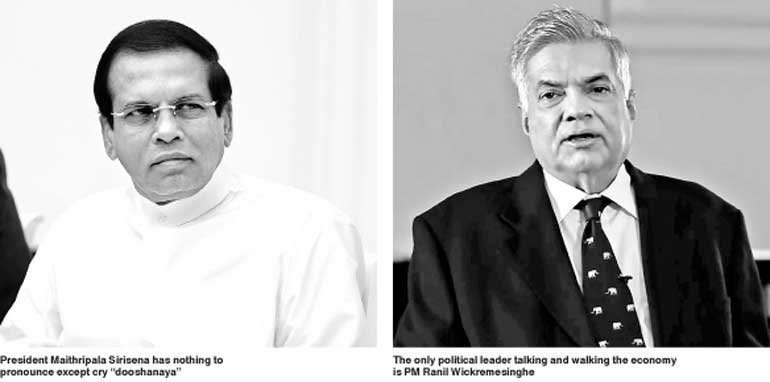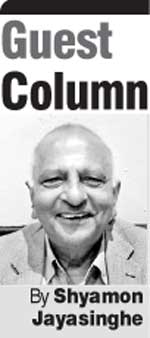Monday Feb 23, 2026
Monday Feb 23, 2026
Saturday, 3 February 2018 00:31 - - {{hitsCtrl.values.hits}}

The electorate has to crowd around these useless and headless blokes and swell their meetings in order to collect the morsels of food and drink and dole-outs from the ill-gotten money of the political class that rules.
Cry of dooshanaya
The discourse is: “dooshanaya! dooshanaya!dooshanaya!” What a bloody harangue! It bores me to anything short of death. Maithripala Sirisena has nothing to pronounce except cry, “dooshanaya”. He is the new swordsman against dooshanaya and he talks as though dooshanaya is something new in his four decades of political experience and, therefore, intolerable.
The JVP cannot be a Third Force as long as it talks only about dooshanaya; it cannot offer any positive program for the economic upliftment of the country. Its vast energy wasted for the dooshanaya critique only goes to help one of the two competing mainstream parties to garner more votes against the other. This is the crisis of the JVP.
Of course, the experts at dooshanaya – the Rajapaksa clan – is also vociferously attacking the ruling party of this disease and comically trying to wash their hands off their 10-year-old dooshanaya circus.
This whole issue has been bloated out of proportion, because as far as the masses are concerned, what they want is bread on their plate; jobs; schools for their kids; solving Colombo’s impossible traffic problem; efficient public transport; scavenging by the local bodies; saving lives from dengue and so on. They wouldn’t care how these public goods come to their door-through corruption or not.
Irrelevant political class
This is the outcome when a whole political class of a country walks and talks in a realm of reality different and irrelevant to the needs of the people. The electorate has to crowd around these useless and headless blokes and swell their meetings in order to collect the morsels of food and drink and dole-outs from the ill-gotten money of the political class.
Politicians are absorbed with the power struggle: how to jump here or there or how to lie for personal advantage. Listening to their blatant lying and tongue-twisting it seems clear that the era of untruth prevails in Lanka, too. In social media, videos are going viral of speeches by politicians like SB, Dilan and Dayasiri during the last presidential election. How they slandered the current President in favour of Mahinda Rajapaksa. Now they are in Sirisena’s lap-safe and cosy!
The print media simply follows the political class-looking for opportunities to survive. One never observes any such media that tries to balance the imbalance and put things in perspective. A few debates on TV form a healthy exception. Generally, however, media takes some side or the other in the dooshanaya vs. dooshanaya battle. Fortunately for the public, the social media and the smart phone fills the gap.
An exception
This is current Sri Lanka’s plight. The only political leader talking and walking the economy is Prime Minister Ranil Wickremesinghe. I will not be doing my duty as a writer if I do not point out this exception to the rule. The reason is that the exception, at least, should be mentioned in order to try and encourage a solitary example to spread at least to the level of a forming a critical mass. If one ignores a healthy exception to a rotten state of affairs, we eventually kill that exception.
I remember reading Nobel laureate in economics, Gunnar Myrdal, arguing that in Third World countries bribery and corruption acts as the lubricant to propel the economic engine in Third World countries. See how Mahinda Rajapaksa delivered some valuable highways! That was Myrdal in action.
 It’s the economy, stupid!
It’s the economy, stupid!
The nation has two key problems and dooshanaya isn’t one of them. The first issue is the urgent need to overhaul the economy and restructure it from its current profile of a debt economy where debt drives it, to an export-led economy. The second is reconciliation. Let’s talk her about economics.
We have to increase exports and, with that, foreign direct investment if we are to grow our economy. Economic growth means the increase in the capacity of an economy to produce goods and services within a specific period of time. It represents the long-term expansion of capacity of an economy and such expansion has been measured by the GNP.
It is only with such an expansion that the needs of the public can be met – the needs for employment, need for increase in the per capital income of the individual so that the latter can do his own, the need for public hard infrastructure and soft infrastructure, needs in public health, in education and, generally of the need for the betterment and prosperity of the average household. The national economic cake must be big enough for the state to distribute its largesse equitably and in the right direction.
Economic growth will stimulate Government finances by enhancing tax revenues. This is how the public needs can be met. An economy snowballs this way into higher and higher growth as capital accumulates both in the treasury of the government and the coffers of the private entrepreneur. It is encouraging to hear the Finance Minister labelling his budget as the entrepreneurs’ budget. Entrepreneurs are the agents that drive an economy; not beggars. Not political thugs.
The Western model
Here, in Australia, the economy has grown considerably and successively over the last twenty-five years and see what amount of public needs are being met! How the disabled and the vulnerable in society are cared for! In Scandinavian countries the situation is even better.
The whole Western world is ahead because of economic growth. Is there any point demanding a government to do anything for the people when the national economy-cake is so small? In these Western lands it is the private sector that has been the active dynamo of growth. Profit incentives act as the primary motivating force.
Populist model in Lanka
Successive governments since 1956 ruined the path of private enterprise by taking over every business enterprise that came their way. Nationalisation is a mandatory act of common-sense. Owners of capital are evil.
The SLFP has been the principal offender in this regard, having been the party that sucked into a creed of populism. Keep giving free as much as possible – everything under the sun. That everything must be budgeted for isn’t the concern. Take-over and give.
Mrs. B famously said she would bring rice from even the moon and distribute free to the people. We used to go to the co-op, carrying our bags and collect free rice. People began believing that any government is possessed of a magic money-delivering kapruka or tree to give very dash thing fee like this. Hence, demanding and protesting is the only thing for the public to do. The public mindset has been made that a government, by definition, is the great provider.
The country ran broke and this is how the debt economy was born. It is critical for our nation’s survival to rectify this situation and revolutionise the country’s economy. The introduction of liberalised trading and the open economy in 1977 was one of our best economic decisions of our recent past. So were the Free Trade Zones to attract foreign direct investment-done at the same time.
Applause
One must applaud our Prime Minister for trying to reconnect with that path. Good signs are already showing. Foreign direct investment has picked up. Debt management and fiscal management is improving and the economy is, slowly but surely, looking up. The PM goes all over the world on economic missions with little gratitude from even the President who now says he will take over the running of the economy! Oh my God! What is to come?
I see Maithri waving at crowds with the typical old SLFP populism – promising price cuts and tax cuts at his will. Like bringing rice from the moon. If tax cuts are made, the lost revenue must be found to avoid a gap. On the other hand, the President thinks the money will “just flow down”.
A few bodhi poojas will do the job – he probably thinks.
(The writer can be reached via [email protected].)